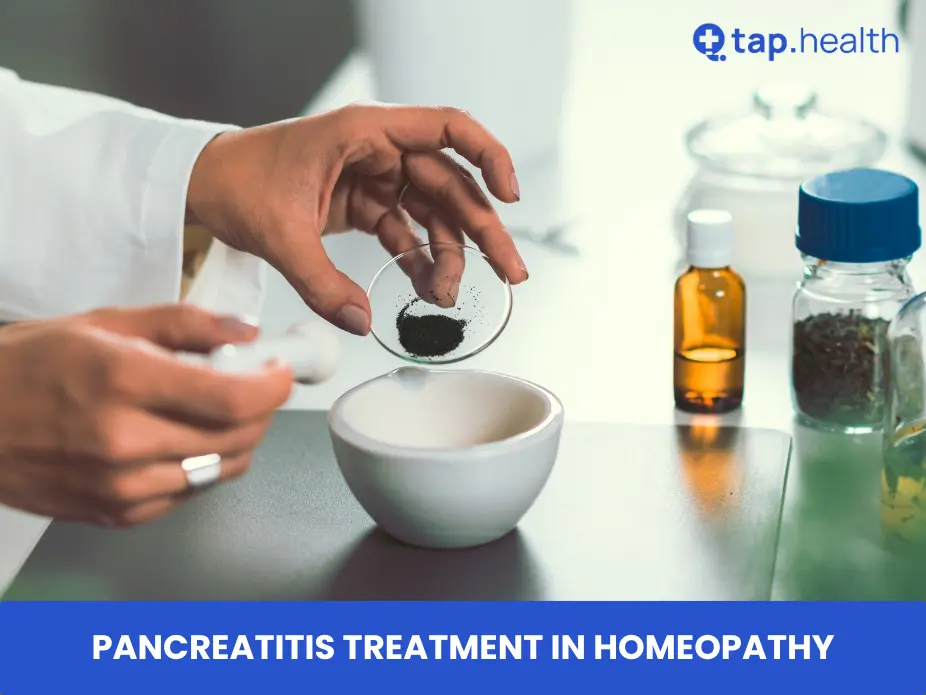Pancreatitis is a condition that causes inflammation of the pancreas, an essential organ in your digestive system. While conventional medicine offers various treatments, some people turn to homeopathy for alternative solutions. This post explores pancreatitis, its types, symptoms, causes, risk factors, diagnosis, conventional treatments, and homeopathic treatments.
What is Pancreatitis?
Pancreatitis is the inflammation of the pancreas, an organ located behind the stomach. The pancreas plays two main roles: it produces digestive enzymes to help break down food, and it releases hormones like insulin and glucagon to regulate blood sugar levels. When the pancreas becomes inflamed, it can affect its ability to perform these functions properly, leading to digestive problems and other complications.
Pancreatitis can occur suddenly (acute) or develop over many years (chronic). Understanding the nature of the inflammation helps in determining the appropriate treatment and management strategies.
Types of Pancreatitis
There are two main types of pancreatitis:
- Acute Pancreatitis: This type occurs suddenly and lasts for a short period. It can range from mild discomfort to a severe, life-threatening illness. Acute pancreatitis is usually caused by gallstones or heavy alcohol consumption. The inflammation can cause severe abdominal pain, nausea, and vomiting. In severe cases, acute pancreatitis can lead to complications like infection, bleeding, and organ failure. Immediate medical attention is crucial for managing acute pancreatitis effectively.
- Chronic Pancreatitis: This type is a long-lasting inflammation that occurs over many years. It often leads to permanent damage to the pancreas. Chronic pancreatitis is usually caused by long-term alcohol abuse, genetic disorders, or chronic conditions like cystic fibrosis. Over time, chronic pancreatitis can lead to persistent abdominal pain, malnutrition, and diabetes due to the pancreas’s impaired ability to produce enzymes and insulin.
Symptoms of Pancreatitis
The symptoms of pancreatitis can vary depending on the type and severity of the condition:
Acute Pancreatitis Symptoms
- Severe Abdominal Pain: The pain usually begins in the upper abdomen and can radiate to the back. It often starts suddenly and can be intense and constant.
- Nausea and Vomiting: These symptoms often accompany the abdominal pain and can lead to dehydration if severe.
- Fever: A low-grade fever is common in acute pancreatitis due to inflammation.
- Rapid Pulse: An increased heart rate can occur as the body responds to the pain and inflammation.
- Tenderness in the Abdomen: The abdomen may be sensitive to touch, indicating inflammation and possible swelling.
Chronic Pancreatitis Symptoms
- Persistent Upper Abdominal Pain: The pain can be continuous or episodic and often worsens after eating or drinking, especially fatty foods.
- Weight Loss Without Trying: Due to the pancreas’s reduced ability to produce digestive enzymes, the body may not absorb nutrients properly, leading to weight loss.
- Oily, Smelly Stools (Steatorrhea): The lack of digestive enzymes can cause fat to remain in the stool, making it bulky, oily, and foul-smelling.
- Nausea and Vomiting: These symptoms can persist in chronic pancreatitis, especially during flare-ups.
- Diabetes (in Advanced Stages): As the pancreas becomes more damaged, its ability to produce insulin diminishes, potentially leading to diabetes.
Causes of Pancreatitis
Several factors can cause pancreatitis:
- Gallstones: These small stones can block the bile duct, preventing pancreatic enzymes from flowing properly and causing inflammation. This blockage can trigger acute pancreatitis.
- Alcohol Consumption: Heavy alcohol use over many years can lead to pancreatitis by causing repeated inflammation of the pancreas. This is a common cause of chronic pancreatitis.
- Genetic Factors: Certain genetic mutations can make some people more prone to developing pancreatitis. Conditions like hereditary pancreatitis are caused by inherited genetic mutations.
- Medications: Some medications, such as corticosteroids, diuretics, and certain antibiotics, can increase the risk of pancreatitis. These drugs can affect pancreatic enzyme regulation and lead to inflammation.
- High Triglyceride Levels: Extremely high levels of triglycerides in the blood can trigger pancreatitis. This condition, known as hypertriglyceridemia, can cause the pancreas to become inflamed.
Risk Factors of Pancreatitis
Certain factors can increase the risk of developing pancreatitis:
- Excessive Alcohol Consumption: Long-term, heavy drinking is a major risk factor. Alcohol can cause repeated inflammation and damage to the pancreas over time.
- Smoking: Tobacco use can increase the risk and severity of pancreatitis. Smoking can exacerbate the effects of other risk factors, such as alcohol consumption.
- Obesity: Being overweight can increase the likelihood of developing gallstones, which can lead to pancreatitis. Obesity can also cause metabolic changes that affect the pancreas.
- Family History: A family history of pancreatitis can increase your risk. Genetic predisposition plays a significant role in the development of chronic pancreatitis.
- Medical Conditions: Conditions like cystic fibrosis, high triglycerides, and certain autoimmune diseases can raise the risk of pancreatitis. These conditions can directly or indirectly affect the pancreas’s health and function.
Diagnosis of Pancreatitis
Diagnosing pancreatitis involves several steps:
- Medical History and Physical Examination: A doctor will ask about your symptoms, medical history, and conduct a physical examination to check for abdominal tenderness. Understanding your history of alcohol use, gallstones, and other risk factors is crucial.
- Blood Tests: Blood tests can measure levels of pancreatic enzymes, such as amylase and lipase, which are often elevated in pancreatitis. Elevated levels of these enzymes indicate inflammation and damage to the pancreas.
- Imaging Tests: Tests like CT scans, MRIs, and ultrasounds can provide detailed images of the pancreas to detect inflammation, blockages, and damage. These imaging techniques help visualize the extent of pancreatic inflammation and any complications.
- Endoscopic Procedures: Endoscopic ultrasound (EUS) or endoscopic retrograde cholangiopancreatography (ERCP) can help visualize the pancreas and take tissue samples for analysis. These procedures are particularly useful for identifying blockages or structural abnormalities in the pancreas and bile ducts.
Treatment for Pancreatitis
Treatment for pancreatitis depends on the severity and type of the condition:
- Hospitalization: Severe cases of acute pancreatitis may require hospitalization for intravenous (IV) fluids, pain management, and nutritional support. Hospitalization helps stabilize the patient and manage complications.
- Pain Management: Pain relief is a primary goal. Doctors may prescribe painkillers or recommend nerve blocks for severe pain. Managing pain is crucial for improving the patient’s quality of life.
- Enzyme Replacement Therapy: For chronic pancreatitis, pancreatic enzyme supplements can help improve digestion and nutrient absorption. These supplements replace the enzymes that the damaged pancreas can no longer produce.
- Lifestyle Changes: Quitting alcohol and smoking is crucial to managing pancreatitis. A healthy diet, low in fat, can also help reduce symptoms. Lifestyle modifications can prevent further damage to the pancreas and improve overall health.
- Surgery: In severe cases, surgery may be needed to remove blockages, drain cysts, or even remove part of the pancreas. Surgical intervention is considered when other treatments are ineffective or complications arise.
Pancreatitis Treatment in Homeopathy
Homeopathy is an alternative medicine system that uses highly diluted substances to stimulate the body’s healing processes. While not universally accepted by the medical community, some people find relief from homeopathic treatments for pancreatitis. Here are some commonly used homeopathic remedies:
- Nux Vomica: Often used for digestive issues related to overindulgence in alcohol and rich food. It may help alleviate nausea, vomiting, and abdominal pain. Nux Vomica is believed to support liver and digestive health.
- Iris Versicolor: This remedy is used for pancreatic conditions and can help with burning pain in the pancreas, vomiting, and diarrhea. Iris Versicolor is thought to support pancreatic function and reduce inflammation.
- Phosphorus: Used for inflammation of the pancreas, this remedy may help with pain, vomiting, and digestive disturbances. Phosphorus is believed to have anti-inflammatory properties and support overall digestive health.
- Lycopodium: Known to aid in digestive issues, this remedy can help with bloating, flatulence, and pain after eating. Lycopodium is thought to improve digestive enzyme production and reduce abdominal discomfort.
- Arsenicum Album: Often used for gastrointestinal issues, this remedy can help with severe abdominal pain, vomiting, and diarrhea. Arsenicum Album is believed to support the body’s natural detoxification processes and improve digestive health.
Note: Homeopathic treatments should be used under the guidance of a qualified homeopath and should not replace conventional medical treatments, especially for severe conditions like pancreatitis.
When to See a Doctor
It’s important to seek medical attention if you experience:
- Severe Abdominal Pain: Persistent and severe pain in your abdomen, especially if it radiates to your back. Severe pain can indicate acute pancreatitis or complications of chronic pancreatitis.
- Unexplained Weight Loss: Significant weight loss without trying could be a sign of chronic pancreatitis. Malabsorption and digestive issues can lead to unintentional weight loss.
- Digestive Problems: Ongoing digestive issues, such as diarrhea, constipation, or oily stools, warrant medical attention. These symptoms can indicate malabsorption and pancreatic insufficiency.
- Nausea and Vomiting: Persistent nausea and vomiting can indicate pancreatitis and should be evaluated by a doctor. Severe nausea and vomiting can lead to dehydration and require medical intervention.
Real-Life Scenario
Consider a patient experiencing recurring mild pancreatitis with bloating and indigestion. A homeopath may recommend lifestyle changes alongside individualized remedies to ease digestive discomfort, reduce inflammation, and improve appetite. For example, adjusting diet to include easily digestible foods while taking tailored remedies can help improve quality of life and prevent flare-ups.
Expert Contribution
Homeopathic practitioners emphasize a holistic approach, treating not just the pancreas but the overall digestive system. According to experts, remedies should be carefully selected based on detailed symptom analysis, temperament, and medical history. Clinical studies suggest that while homeopathy can provide symptomatic relief, it should be integrated with conventional care for acute cases.
Recommendations Grounded in Proven Research and Facts
- Consult a qualified homeopath before starting any remedies.
- Use homeopathy as a complementary therapy, not a replacement for medical treatment in acute pancreatitis.
- Follow a pancreas-friendly diet: avoid fatty, spicy, and processed foods.
- Monitor symptoms closely: worsening pain, jaundice, or vomiting requires immediate medical attention.
- Maintain overall digestive health: staying hydrated and managing stress can support recovery.
FAQ on Pancreatitis Treatment in Homeopathy
1. Is Homeopathy Effective for Treating Pancreatitis?
Homeopathy can provide relief for some symptoms of pancreatitis, but it should not replace conventional medical treatments. Consult a healthcare professional before starting any alternative treatments.
2. How Long Does It Take for Homeopathic Remedies to Work?
The effectiveness and duration of homeopathic treatment can vary depending on the individual and the severity of the condition. Some people may experience relief within days, while others may take longer.
3. Can Homeopathy Be Used Alongside Conventional Treatments for Pancreatitis?
Yes, homeopathy can be used as a complementary therapy alongside conventional treatments. However, it is important to inform your healthcare provider about any homeopathic remedies you are using.
4. Are There Any Side Effects of Homeopathic Treatments?
Homeopathic remedies are generally considered safe with minimal side effects because they are highly diluted. However, it is important to use them under the guidance of a qualified homeopath.
5. What Lifestyle Changes Can Help Manage Pancreatitis?
Quitting alcohol and smoking, maintaining a healthy diet, and managing underlying health conditions can help manage pancreatitis. Regular medical check-ups are also important to monitor the condition and adjust treatments as needed.
References
- Relevant Article: Pancreatitis
- Relevant Article: Pancreatitis



